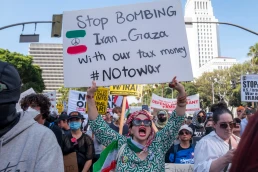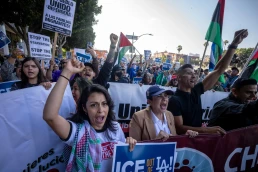Abolitionists and advocates of criminal justice reform in Los Angeles County have amassed some impressive victories, laying out a vision for reducing incarceration and providing care that could have national significance.
By Mark Engler and Paul Engler, Dissent
In the late spring and summer of 2020, protests for racial justice erupted in response to the police murder of George Floyd. Mobilizations spread throughout the country and continued for months, producing what scholars identified as arguably the largest wave of mass protest in U.S. history.

However, as with other surges of popular uprising, the actions died down over time. At that point, critics claimed that protesters made a lot of noise and drew public attention but were unable to translate their discontent into concrete policy gains. When the moment of peak protest passed, these detractors held, the movement disappeared with little to show for its efforts.
This narrative overlooks ongoing organizing efforts that have made important gains both before and after mass protests captured the spotlight. And there are few better places to see such organizing in action than Los Angeles County.
While their work has gotten little national attention, organizers in L.A. have amassed some impressive victories. First, in 2019, a coalition against mass incarceration succeeded in stopping a prison expansion plan that the county claimed would cost $2 billion, but that activists and community leaders charged could drain in excess of $3.5 billion in public funds. Subsequently, grassroots groups steered the work of a county Alternatives to Incarceration Workgroup, which in 2020 produced a set of recommendations that JusticeLA, a coalition of more than fifty community organizations, unions, and activist groups, called “a groundbreaking roadmap for decarceration and service expansion.”
Recent Posts
Is A Citizens United 2.0 Right Around The Corner?
July 15, 2025
Take Action Now Is it possible for American democracy to be further degraded by the influence of billionaires? Thanks to champion of the working…
U.S. Leaders Gave Up On Diplomacy With Iran. We Must Make Them Return To It.
July 15, 2025
Take Action Now Building an antiwar movement means preventing the systemic U.S. aggression that creates the conditions for war.By Hanieh Jodat,…
What To Do When You See ICE In Your Neighborhood
July 14, 2025
Take Action Now How can you deter the Trump administration’s immigrant deportation machine when it pops up in your community? Follow these…
ICE Campaign Of Violence Will Lead To More Deaths
July 14, 2025
Take Action Now Jaime Alanis’s death shows the horrific consequences of a secret police force behaving with utter impunity.By Natasha Lennard, The…




